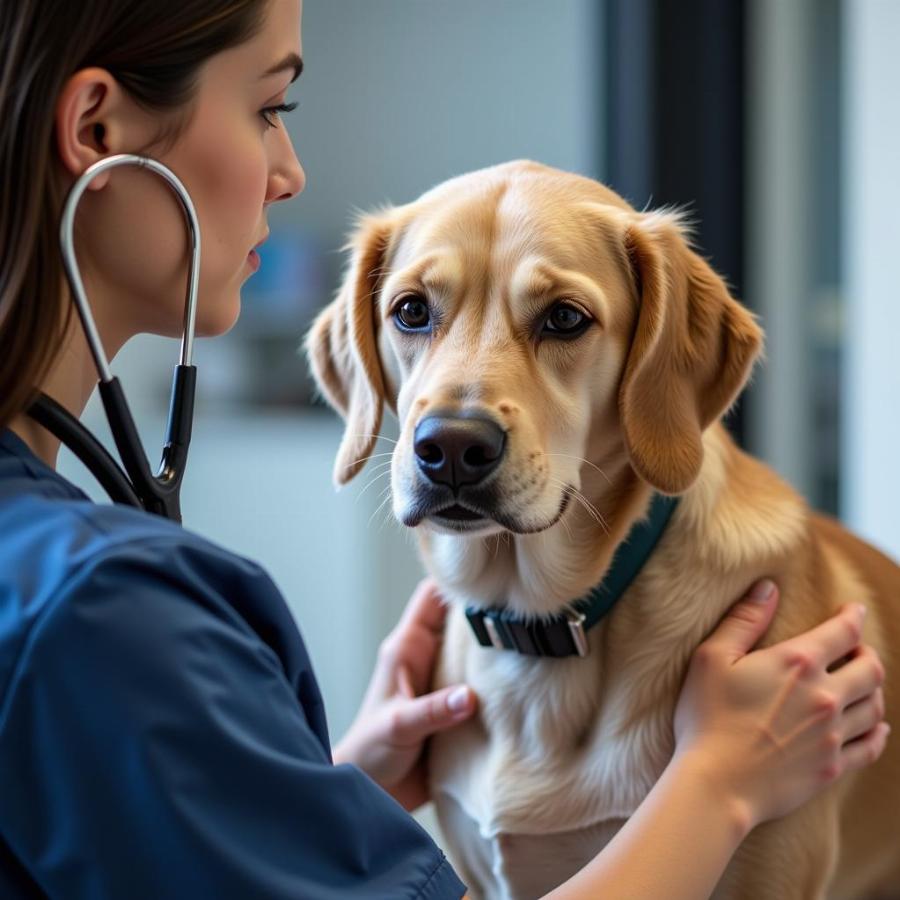Lung cancer in dogs, although less common than other cancers, is a serious concern. Understanding the symptoms of dog lung cancer is crucial for early diagnosis and treatment, potentially improving your furry friend’s quality of life. This article will guide you through the common indicators of this disease, helping you recognize potential warning signs and take appropriate action.
Recognizing the Subtle Signs of Dog Lung Cancer
Dog lung cancer symptoms can be subtle and often mimic other respiratory conditions, making early detection challenging. If your dog displays any of the following symptoms, it’s important to consult a veterinarian immediately. Don’t hesitate; early intervention can make a difference.
- Persistent Cough: A cough that lasts for more than a few weeks, especially if it’s dry and hacking, can be a significant indicator. symptoms of lung cancer in dogs are often overlooked, so pay close attention to any changes in your dog’s cough.
- Difficulty Breathing (Dyspnea): Labored breathing, rapid panting, or shortness of breath, even after minimal exertion, are all potential signs of lung issues. Observe your dog during walks and playtime for any unusual breathing patterns.
- Loss of Appetite and Weight Loss: These are general signs of illness but can also point towards cancer. If accompanied by other respiratory symptoms, they warrant further investigation.
Other Potential Indicators
While the above are the most common symptoms, other signs can also indicate lung cancer. These include:
- Lethargy and Weakness: A significant decrease in energy levels, unwillingness to play, and general fatigue can be associated with the disease.
- Wheezing: A whistling sound during breathing, indicating narrowed airways, can be present.
- Coughing up Blood (Hemoptysis): This is a more advanced symptom and requires immediate veterinary attention.
- Limping or Lameness: While seemingly unrelated, lung cancer can sometimes metastasize to the bones, causing pain and lameness. sarcoma in dogs leg can share similar symptoms, so a proper diagnosis is essential.
What to Do if You Suspect Lung Cancer
If your dog exhibits any dog lung cancer symptoms, don’t panic. Schedule an appointment with your veterinarian as soon as possible. They will perform a thorough physical examination and recommend diagnostic tests, such as X-rays, CT scans, and biopsies, to determine the underlying cause.
 Veterinarian Examining a Dog
Veterinarian Examining a Dog
Diagnosing and Treating Canine Lung Cancer
Early diagnosis is key to managing dog lung cancer. Treatment options may include surgery, chemotherapy, radiation therapy, or palliative care. The specific approach will depend on the stage and type of cancer, as well as your dog’s overall health.
Conclusion
Recognizing the symptoms of dog lung cancer is crucial for early diagnosis and intervention. If you notice any unusual changes in your dog’s breathing, coughing, or overall health, consult your veterinarian promptly. dog lung cancer is a serious condition, but early detection and appropriate treatment can significantly improve your dog’s quality of life. Don’t hesitate to seek professional help; your furry friend’s well-being depends on it.
FAQs
- What are the most common signs of lung cancer in dogs? Persistent coughing, difficulty breathing, loss of appetite, and weight loss.
- Is lung cancer common in dogs? It’s less common than other types of cancer in dogs.
- Can lung cancer in dogs be cured? The prognosis varies depending on the stage and type of cancer. Early detection and treatment offer the best chance for a positive outcome.
- What are the treatment options for canine lung cancer? Surgery, chemotherapy, radiation therapy, and palliative care.
- How can I prevent lung cancer in my dog? While there’s no guaranteed prevention, minimizing exposure to secondhand smoke and environmental toxins can help reduce the risk.
- What is the life expectancy of a dog with lung cancer? This depends on various factors, including the stage of cancer, the dog’s age and overall health, and the chosen treatment approach. lung cancer in dogs can progress rapidly, so prompt veterinary care is essential.
- Can benign lung tumors in dogs cause similar symptoms? Yes, some benign conditions can mimic lung cancer symptoms, making accurate diagnosis crucial. mammary tumors in dogs life expectancy for example, vary depending on the nature of the tumor.
Beaut Dogs is your trusted source for comprehensive information on all aspects of dog care, offering expert advice and resources to help you provide the best possible care for your canine companion. When you need support, contact us at Email: [email protected] to receive detailed and accurate answers from Beaut Dogs. Visit us at https://beautdogs.com.